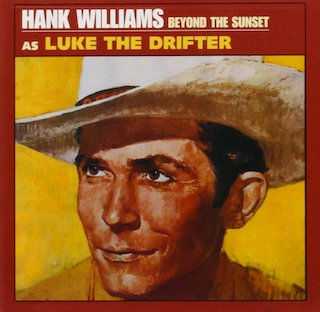Related Research Articles
"I'll Never Get Out of This World Alive" is a song written by Fred Rose and American country music singer-songwriter Hank Williams, released by Williams in 1952.

"Kaw-Liga" is a country music song written by Hank Williams and Fred Rose.
"Ramblin' Man" is a song written in 1951 by Hank Williams. It was released as the B-side to the 1953 number one hit "Take These Chains from My Heart", as well as to the 1976 re-release of "Why Don't You Love Me". It is also included on the 40 Greatest Hits, a staple of his CD re-released material.
"Men with Broken Hearts" is a song written and recorded by Hank Williams under the pseudonym "Luke the Drifter." It was released on MGM Records in 1951.

"I'm a Long Gone Daddy" is a country song written and recorded by Hank Williams. It was released in 1948 on MGM Records and became his second top ten hit.
"Settin' the Woods on Fire" was the A-side of a single by Hank Williams, released in September 1952. The song reached number 2 on U.S. Billboard Most Played by Jockeys chart and number 2 on the National Best Sellers chart.
"A Mansion on the Hill" is a song written by Hank Williams and Fred Rose and originally recorded by Williams on MGM Records. It peaked at No. 12 on the Most Played Jukebox Folk Records chart in March 1949.
"My Son Calls Another Man Daddy" is a song written by Jewell House and made famous by country star Hank Williams, who released the song in 1950.
"Baby, We're Really in Love" is a song written and recorded by Hank Williams and released on MGM Records. It peaked at number four on the Billboard country singles chart. It was recorded at Castle Studio in Nashville on July 25, 1951 with Fred Rose producing and backing from Don Helms, Jerry Rivers (fiddle), Sammy Pruett, Howard Watts (bass) and probably Jack Shook. It was his fourteenth Top 5 hit.
"Weary Blues from Waitin'" is a song written by Hank Williams. It was released as a posthumous single on MGM Records in 1953.

Hank Williams as Luke the Drifter is an LP by Hank Williams released by MGM Records in 1954. It features narrations that Williams released under the pseudonym Luke the Drifter.
Pictures from Life's Other Side" is a traditional song popularized by Hank Williams under the pseudonym "Luke the Drifter." It was released on MGM Records in 1951.
"The Funeral" is a song credited to Hank Williams with words from Will Carleton. It was released as a single under the pseudonym Luke the Drifter by MGM Records in 1950.

"Just Waitin" is a song written by Hank Williams and released as the A-side of "Men with Broken Hearts" in 1951 on MGM Records. It was released under the pseudonym "Luke the Drifter."
"Beyond the Sunset" is a song written by Blanche Kerr Brock, Virgil P. Brock, and Albert Kennedy Rowswell. It was released as a single by Hank Williams under the pseudonym Luke the Drifter in 1950.

"Too Many Parties and Too Many Pals" is a song released by Hank Williams under the pseudonym Luke the Drifter. The song dates back to at least 1926 when it was recorded by a number of artists including the Bar Harbor Society Orchestra. It had also previously been recorded and released in 1948 by Bill Haley as Bill Haley and the 4 Aces of Western Swing; this was Haley's first professionally released single.
"Help Me Understand" is a song written by Hank Williams and released under the name "Luke the Drifter" on MGM Records in 1950.
"Please Make Up Your Mind" is a song written and recorded by Hank Williams and released as a "Luke the Drifter" single in 1952.
"I've Been Down That Road Before" is a talking blues song by Hank Williams. It was released by MGM Records under the name "Luke the Drifter", which was a pseudonym for Hank's recitations. It was another dose of the sage advice that Luke the Drifter seemed endlessly capable of dispensing - and Hank Williams seemed just as capable of ignoring. Biographer Colin Escott calls it "perhaps the most directly biographical song he ever wrote, and leaves us guessing at the incidents that inspired it." He recorded it in Nashville on June 1, 1951 with Fred Rose producing and backing by Jerry Rivers (fiddle), Don Helms, Sammy Pruett, Jack Shook, Ernie Newton or "Cedric Rainwater", aka Howard Watts (bass), and possibly Owen Bradley (organ).
"Be Careful of Stones that You Throw" is a song recorded by Hank Williams. It was written by Bonnie Dodd.
References
- ↑ "U.S. Copyright Office Virtual Card Catalog 1946-1954". vcc.copyright.gov. Retrieved 2021-09-09.
- ↑ "Hank Williams 78rpm Issues". jazzdiscography.com. Retrieved 2021-09-23.
- 1 2 Escott 2004, p. 149.
- ↑ Escott 2004, p. 336.